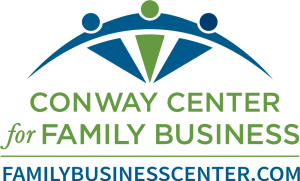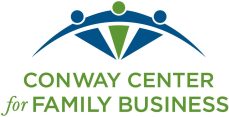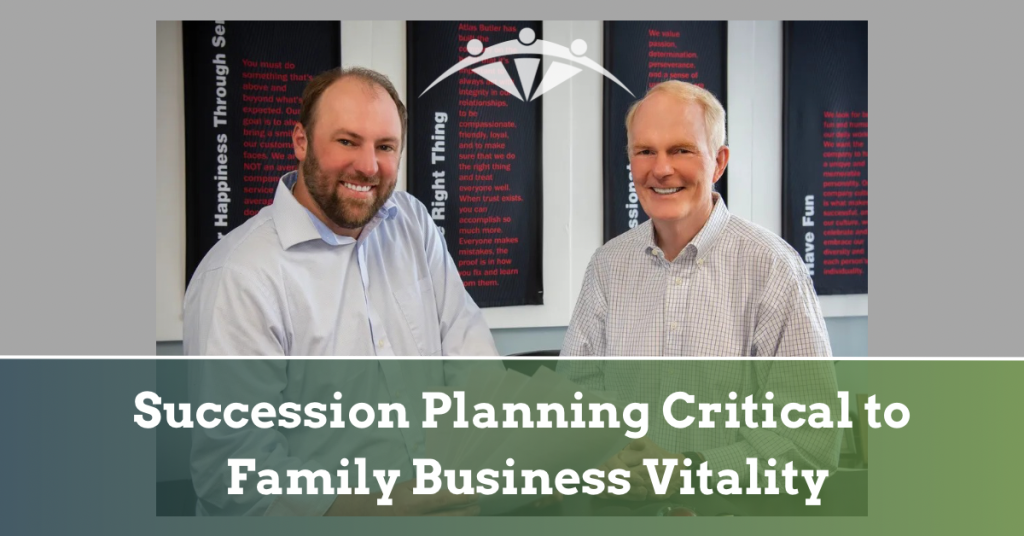Mark Swepston spent his professional life building an already strong company, Atlas Butler, into an even more vibrant, community-oriented organization that is a nationally recognized leader in comprehensive HVAC and plumbing solutions.
Yet with this success, as a third-generation family business leader, he had a nagging concern: What would happen if he suddenly left the firm? Indeed, that very situation happened when his own father unexpectedly passed away, leaving Mark in charge at age 31.
Mark was not alone. While industry studies suggest formalizing a succession plan may be the most important step a family business can take to ensure success and longevity, only one in three have done so.
“From my own experience, I knew how important it was,” he said. “Participating in industry programs, including with the Conway Center for Family Business, helped prompt me to make it a priority.”
Although day-to-day demands kept getting in the way, Mark took action.
Mark set a goal to complete succession by Atlas Butler’s 100th anniversary in 2021. When his son Michael joined the company in 2009, Mark began formalizing the plan, so Michael wasn’t confronted with the same situation he had been in. Michael took over as president in 2019.
What is Succession Planning?
Conway Center for Family Business defines succession planning as the strategic process of transferring roles and responsibilities within the family business to new individuals, family or non-family. Typically, succession planning focuses on replacing executive and leadership positions. It’s critical that conversations about succession planning are initiated and supported by company leaders.
“Every organization experiences some form of succession,” according to Jill Hofmans, executive director, Conway Center. “A good succession plan can take three to seven years to complete so it is critical to be thoughtful.”
While succession planning can prompt strong emotions about the leading-gen’s ability to guide a family business and the next-gen’s readiness to assume leadership, delaying may have significant implications:
- Clients and stakeholders lose trust in the family business as performance declines.
- Leading-gens feel “forced out” by the time succession is necessary or are disappointed when next-gens seek careers outside of the family business.
- Next-gens may question the path forward, including strategies to adopt new technologies such as generative AI.
The Succession Planning Process
Succession planning can be a daunting topic to bring up in a C-suite meeting.
“Getting the conversation started is often the greatest challenge,” said Matina Zenios, president, Artina Promotional Products, located in Powell. “Treat it like a critical business matter -- not a secondary family topic to discuss as time permits.”
Thankfully, there are plenty of resources to help.
“The Conway Center helps family business leaders and next-gens kick-start their succession plans,” Hofmans said. “Our peer groups and educational programs offer input from business leaders who have successfully navigated the process and can provide strategic advice as well as tips on managing family dynamics.”
For Matina, the co-owner and second-generation leader at Artina, preparing properly also meant bringing in experts such as her law firm.
“Having legal counsel specializing in succession planning was a huge benefit,” she said. “Strong counsel also helped ensure my father, the founder, always had his needs and interests addressed, and our conversations were transparent.”
Key planning tips gleaned from Conway Center programs include:
- Choose a successor – privately. If a family member is not a first or back up choice, a non-family leader can step in until the next gen is ready.
- Develop the successor – publicly. Assess their skills and implement a development plan for the successor to be ready even before the current leader retires.
- Nurture the successor. Physically transferring ownership may be the easiest part of a transition. Even more critical are steps to ensure a transition is seamless. This involves enhancing the successor’s business leadership and relationship skills.
- Plan for unexpected scenarios, including death or disability of a principal, divorce of family members, or even dissolution of the company through a sale or bankruptcy.
- Protect the business. Legally, considerations may include executing documents such as buy-sell agreements or pre-nuptial agreements. Financially, a careful review of tax and estate implications of any asset sale or transfer, the need to establish trusts, and having sufficient insurance can make the succession process significantly smoother.
Start by joining a Conway Center Peer Group!
Whether you’re a next gen or leading gen, Conway Center has a peer group for you. You’ll learn from others who are in the process or have been there, done that (or both!). If you are early in your family business succession journey, you’ll start feeling comfortable as you learn the “language” of succession planning and all that it entails. “Joining Conway’s next-gen peer group was very important to me,” Matina said. “My father, brother and I are life-long learners. Knowing that others are in my situation and are willing to share their perspectives has been invaluable to my entire family.”

The time to start is now! Want to learn more? Email info@familybusinesscenter.com. Experts are waiting to help guide you!

